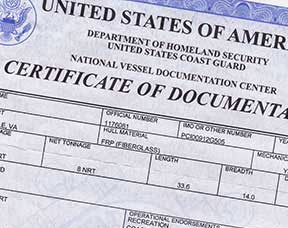Scams Prevalent in Yacht Buying Transactions
Two scams are impacting the successful completion of yacht buying transactions. It was bound to happen as these documentation and wire-transfer scams have plagued the real estate industry for years. And, buying a yacht often involves larger sums of money than people’s homes.
We have personally seen one of these scams play out with a broker and it was a nightmare for both him and his client. Hundreds of thousands of dollars vanished into thin air! It seems that these scammers hijacked the email communications between the two parties and diverted the money to their own bank account. The broker and his client were totally oblivious to it and only figured this out days later when the money transfer did not appear in the escrow bank account. It is crucial that you talk to the person receiving the money tranfer to confirm wire transfer details BEFORE you wire the money.
Learn more about these scams and how to protect yourself from them.
Vessel Documentation Scam
 This scam is possible because boat owners try to save time by using a website that offers documentation renewal services for a fee. These websites cleverly appear official and Coast Guard-like. Boat owners who fall victim to these “services” often spend triple the standard Coast Guard Vessel Documentation fee, and, even worse, Coast Guard boarding officers will not accept their vessel documentation.
This scam is possible because boat owners try to save time by using a website that offers documentation renewal services for a fee. These websites cleverly appear official and Coast Guard-like. Boat owners who fall victim to these “services” often spend triple the standard Coast Guard Vessel Documentation fee, and, even worse, Coast Guard boarding officers will not accept their vessel documentation.
The U.S. Coast Guard’s National Vessel Documentation Center in Falling Waters, West Virginia, is the only entity authorized to issue Certificates of Documentation. To protect yourself, be sure you are working with the Coast Guard and paying only a nominal fee (in 2017, $26/year). For more information on Certificates of Documentation, call the Coast Guard’s National Vessel Documentation Center at 800-799-8362 or visit the official website at National Vessel Document Center.
Read more about this scam in Coast Guard Petty Officer 1st Class Bill Colclough’s story.
Fraud In Yacht Sale Transactions
 Criminals have begun to realize that the yachting industry offers similar bounties for money exchanging scams that the real estate market offers. Yacht owners, brokers, and others in the industry have been financially damaged by fraudulent wire-transfer instructions and other scams. Moving large sums of money electronically takes great care and diligence to avoid the pitfalls that have devastating results.
Criminals have begun to realize that the yachting industry offers similar bounties for money exchanging scams that the real estate market offers. Yacht owners, brokers, and others in the industry have been financially damaged by fraudulent wire-transfer instructions and other scams. Moving large sums of money electronically takes great care and diligence to avoid the pitfalls that have devastating results.
Yacht brokers and boat owners must actively defend themselves against these scams:
- Follow your banks’ best practices. For example, your bank may require you to confirm wire-transfer instructions with the recipient by phone.
- Brokers should implement procedures to ensure that all wire-transfer instructions are confirmed in advance of closing and to carefully scrutinize changes to wire-transfer instructions.
- Protect yourself from email scams:
- Protect email accounts by using strong passwords and two-step or similar authentication.
- Never follow a link or open an attachment from an unknown sender.
- Pay close attention to email addresses as they can be spoofed making you believe it is from an institution or person you trust.
- Be careful with checks:
- Do not accept checks in excess of the amount of the transaction that require you wire the overage back to the check issuer.
- Do not wire funds deposited by a check until your bank confirms that it has cleared.
To learn more about how these scams work and how you can protect against them, read this article on yacht transaction scams from the International Yacht Brokers Association.
Check our vessel documentation recommendations.






